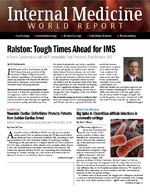Are Biologics Useful in Treating Crohn's disease?
Are Biologics Useful in Treating Crohn’s disease?
Some research points to evidence that Crohn’s disease (CD) and ulcerative colitis (UC) will respond to biological therapies. But no one has taken a systematic look at all of the available evidence. Alexander Ford, MBChB, MD, and colleagues recently published an article that begins to address this issues.
“This research was done as part of the summary of all available evidence to support the American College of Gastroenterology’s monograph on the management of inflammatory bowel disease,” said Dr. Ford from the Leeds Gastroenterology Institute in the United Kingdom. “Until now, no previous meta-analysis had summarized the evidence for efficacy of all FDA-approved biological therapies in inflammatory bowel disease.”
The researchers searched MEDLINE, EMBASE, and the Cochrane central registry of controlled trials through December of 2010. Trials that enrolled adults with active or quiescent CD or UC and compared biological therapies (specifically anti-tumor necrosis factor-a(TNFa) antibodies or natalizumab) with placebo were included in the analysis. Symptom data were pooled to obtain relative risk (RR) of failure to achieve remission in active disease and RR of relapse of activity in inactive disease once remissions had occurred.
The search identified 27 eligible citations. Anti-TNFa antibodies and natalizumab were both superior to placebo in inducing remission of luminal CD (RR of no remission=0.87; 95% confidence interval [CI] 0.80-0.94 and RR=0.88; 95% CI 0.83 to 0.95 respectively). Anti-TNFa antibodies were also superior to placebo in preventing relapse of luminal CD (RR of relapse- 0.71; 95% CI 0.65-0.76). Infliximab was superior to placebo in inducing remission in those with moderate to severe active UC (RR=0.72; 95% CI 0.57-0.91).
“The biological therapies were effective for both inducing remission and preventing relapse of luminal Crohn’s disease, and for inducing remission for ulcerative colitis, said Dr. Ford. “There was less evidence available to support their efficacy in fistulizing Crohn’s disease, but there was a trend toward benefit in terms of inducing fistula healing.”
Subgroup analysis by dosing schedule brought out some interesting information. Infliximab (10mg/kg) at 8-week intervals was superior to placebo in preventing relapse of quiescent luminal CD (RR=0.69; 95% CI 0.58-0.81; Number Needed to Treat (NNT)= 4, 95% CI 3-7). There was no statistically significant difference between adalimub 40 mg every other week or 40 mg weekly versus placebo.
“Evidence-based medicine is always important to influence practice,” said Dr. Ford. “This meta-analysis provides useful summary statistics that clinicians can bear in mind, and quote to patients, when they are instituting biologic therapies, and reassure both physicians and patients that what they are doing is likely to be effective according to level 1a evidence.”
Author Disclosures: Financial support for the study came from the American College of Gastroenterology. Some of the authors reported they have worked as consultants, for speaker’s bureaus or have received research support from pharmaceutical companies.
Source: Ford AC, et al. Efficacy of biological therapies in inflammatory bowel disease: Systematic review and meta-analysis. Am J Gastroenterol. 2011;106:644-659.
